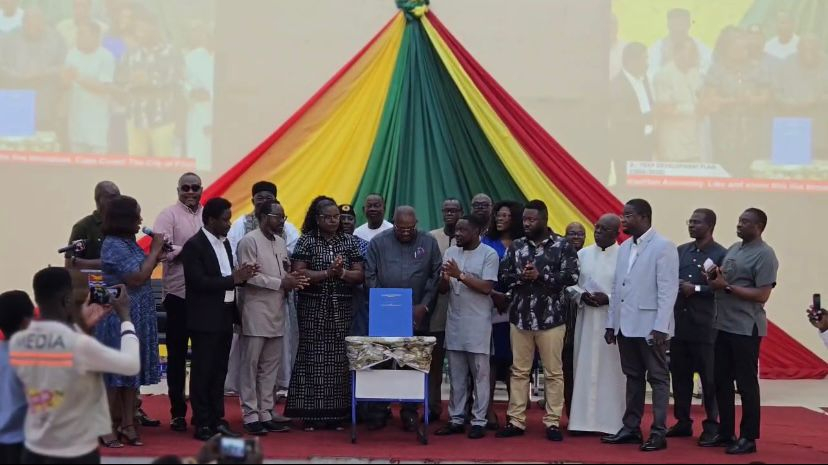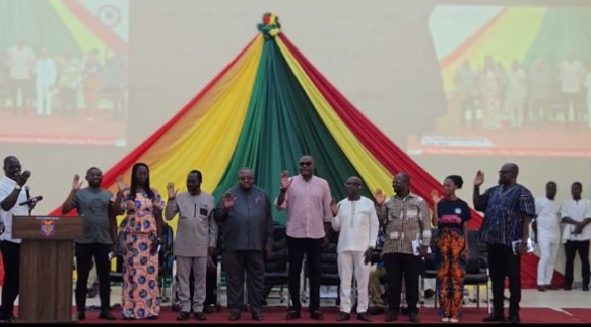This blog is managed by the content creator and not GhanaWeb, its affiliates, or employees. Advertising on this blog requires a minimum of GH₵50 a week. Contact the blog owner with any queries.
Cape Coast – A passionate citizen of Cape Coast and Member of Parliament for Cape Coast North, Dr. Kwamena Minta Nyarku, affectionately called Ragga, in a no-holds-barred speech, has posited that the development of Cape Coast has been eclectic and has not followed any deliberate, coherent pattern over the years.
Joining other dignitaries to launch the 8-Year Development Plan (2026-2033) at the University of Cape Coast (UCC) Graduate School Auditorium on October 9, 2025, he noted “I’m going to be the prodigal son of Cape Coast and be brutally frank about it. Say it as it is. We may take it as it is, we may ignore or appreciate it. I don’t think we’ve been so intentional in making Cape Coast what it is,” he stressed.
Ragga underscored that while Cape Coast has many accolades, including ‘City of Firsts,’ apart from the Cape Coast Castle, there is little else to justify its tag as a tourism hub. To make amends, he called for the urgent development of untapped tourism treasures. “Jacob Wilson-Sey, Philip Quacoe, and the historic Pitman’s School have been left undeveloped for years. We’ve not been intentional about making the city a tourism hub,” he stressed.

The Metropolitan Chief Executive (MCE) for Cape Coast, Hon. George Justice Arthur, later officially launched the maiden Eight-Year Development Plan for the city, urging stronger collaborative support during its implementation.

He noted the plan seeks to revolutionize the development trajectory of Cape Coast, highlighting the comprehensive nature of the document, which carries the city’s aspirations to merit its tag as ‘The City of Firsts’.
Major Themes of the Plan
Outlining the plan’s thematic areas, Hon. Arthur stated it comprises Social Development, Economic Development, Environmental Protection, Infrastructure Delivery and Management, Governance and Administration, and Plan Implementation Measures.
Stakeholder Views on the Plan
Chief Mike Dery, a Presidential Staffer and the Political Coordinator for the Central Region, who represented the Vice President, Prof. Jane Naana Opoku Agyemang, and the Central Regional Minister, set the tone for the event. He applauded the Assembly for its thorough consultation, evidence-based planning, and commitment to long-term benefit over short-term political expediency.
“I’m reliably informed that the CCMA’s 8-Year Development Plan is a product of thorough consultation, evidence-based planning, and commitment to a long-term plan over short-term plans,” he noted.
Dery praised the CCMA management and all stakeholders for originating the 8-Year Development idea, which sets the tone for the development reset agenda for the ancient city.
The Dean of the Faculty of Social Sciences at the University of Cape Coast, Prof. Simon Mariwah, thanked the organizers for the opportunity to represent the faculty and the University. He stated that in tourism education, teaching, and research, his faculty stands tall, emphasizing that their association with the development plan launch was apt.
The Professor of Health Geography and Development noted that the event should not be seen merely as the unveiling of a document, but as something that represents a shared and collective vision to propel the development of Cape Coast.
“This event should represent the collective vision, a social contract with a renewed commitment to transforming Cape Coast into a modern city that we all want to see,” he emphasized.
“That modern city should be inclusive in terms of growth, environmentally sustainable, and culturally relevant,” he stated. He highlighted that the Faculty of Social Sciences, deeply rooted in research, policy analysis, and community engagement, views the plan “not only as a document but as a call to action and partnership.” He stressed that since the university is situated in Cape Coast, they are obliged to be associated with the Mayor’s vision and that of the Assembly.
The CEO of the Ghana Tourism Development Company, Prof. Kobby Mensah, reiterated that the success of the 8-Year Development Plan is a collective responsibility.
He said, “To achieve this requires adopting the philosophy which underpins the MP for Cape Coast North’s campaign – ‘#Obiara Ka Ho’ – to wit, we’re all involved,” he intimated.
Prof. Mensah pointed out that for the city to leap forward, it begins with this plan, which requires the collective efforts of all inhabitants to see it realized.
“I’ve never heard of any DCE or MCE talk about an 8-Year Development Plan; the MCE deserves commendation for this effort,” he said.
Nana Sam Brew-Butler, a prominent Ghanaian entrepreneur and former football administrator, chaired the launch. He revealed that his car narrowly missed a head-on collision while driving to Cape Coast.
“My car nearly collided with an oncoming vehicle that was overtaking incorrectly. I wanted to turn back, but I had to be here because I had promised the Veep I would represent him,” he revealed, to thunderous applause.
The businessman said that historically, Cape Coast has been first in many endeavors, and the time has come for the city to develop its historical sites to help the next generation appreciate the role of some Cape Coast indigenes in Ghana’s history.
“With all these, Cape Coast has not lived up to expectation, and the time to act is now,” he opined.
The Path Forward
A development plan is a formal strategy for achieving desired outcomes, typically involving setting clear goals, outlining specific tasks, assigning responsibilities, establishing timelines, and defining success metrics.
The 8-Year Development Plan for Cape Coast has been officially launched with a call for all stakeholders to give their optimum best to push Cape Coast to the next level of development, to be among the first, if not the first, in Ghana.
With renewed commitment and an unwavering desire to succeed, backed by sheer grit and tenacity, only time will determine the outcome of the plan.


